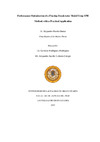Identificador persistente para citar o vincular este elemento:
https://accedacris.ulpgc.es/jspui/handle/10553/10363
| Título: | Performance Optimization of a Floating Breakwater Model Using SPH Method, with a Practical Application | Autores/as: | Rueda Durán, Alejandro | Director/a : | Rodríguez Rodríguez, Germán Cabrera Crespo, Alejandro Jacobo |
Clasificación UNESCO: | 251007 Oceanografía física 330511 Puertos |
Palabras clave: | Floating Breakwater Smoothed Particle Hydrodynamic Waves and Coastal Structures |
Fecha de publicación: | 2013 | Resumen: | The use of a floating breakwater, as an environmentally friend structure, is suggested as a coastal protection structure for the EGSAM pier in Santa Marta Bay, Caribbean Colombian coast. A large number of floating breakwater structures existing in the literature are examined and compared to define the structure to be used in the studied case. The selection of the more adequate structure is mainly based on two aspects, their dimensions and efficiency, in terms of the wave energy transmission. The efficiency assessment, as a function of the incident wave period and the distance between the floating breakwater and the pier, has been carried out by means of the smoothed particle hydrodynamic (SPH) method, a free-mesh numerical method. Results reveal that SPH method properly simulates the interaction between water waves and a coastal protection structures. Nevertheless, 3D numerical experiments require considerable computational cost, whereas the use of 2D experiments alleviates these drawbacks but include unrealistic effects, mainly due to the presence of closed, non dissipative, boundaries. The proposed structure for the EGSAM pier reveals considerable advantages in contrast with conventional coastal protection structures, which must be evaluated in a wave channel, as part of the design process. | Descripción: | Máster en Oceanografía | Departamento: | Física | Facultad: | Facultad de Ciencias del Mar | URI: | https://accedacris.ulpgc.es/handle/10553/10363 | Derechos: | by-nc-nd |
| Colección: | Trabajo final de máster |
En el caso de que no encuentre el documento puede ser debido a que el centro o las/os autoras/es no autorizan su publicación. Si tiene verdadero interés en el contenido del mismo, puede dirigirse al director/a o directores/as del trabajo cuyos datos encontrará más arriba.
Vista completaVisitas
230
actualizado el 15-ene-2026
Descargas
462
actualizado el 15-ene-2026
Google ScholarTM
Verifica
Comparte
Exporta metadatos
Los elementos en ULPGC accedaCRIS están protegidos por derechos de autor con todos los derechos reservados, a menos que se indique lo contrario.
